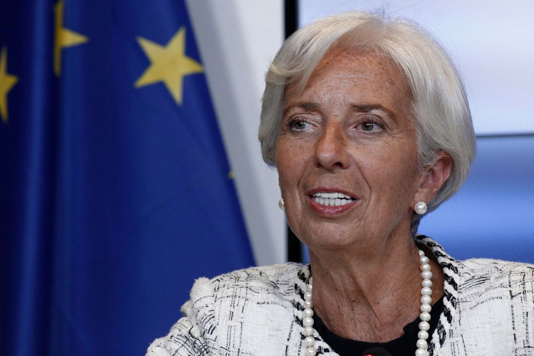FRANKFURT AM MAIN, March 11, 2021 (BSS/AFP) – European Central Bank chief
Christine Lagarde will be under pressure Thursday to soothe market jitters on
rising inflation and bond yields that could hobble the eurozone’s recovery
from the pandemic.
The meeting of the ECB’s 25-member governing council is not set to lead to
any changes in the bank’s ultra-loose monetary policy.
But Lagarde’s 2:30 pm (1330 GMT) press conference in Frankfurt will be
scrutinised for clues on what it would take for the ECB to unleash more
stimulus to ease fears of a premature end to cheap money.
Global markets have been roiled recently by a rapid rise in bond yields,
triggered by signs of higher inflation on the horizon.
Investors fear faster price growth could force a hike in interest rates
that would make borrowing more expensive, hampering recovery in the virus-
stricken eurozone.
“To avoid an unwarranted tightening of financing conditions — in plain
words: a market upset — the ECB needs to provide clearer guidance and
explain its reaction function better this Thursday,” said Berenberg bank
analyst Florian Hense.
The ECB last year took unprecedented action to help the 19-nation currency
club weather the coronavirus shock, launching a 1.85 trillion euro ($2.2
trillion) pandemic emergency bond-buying programme (PEPP) that is set to run
until March 2022.
It has also held interest rates at record lows and offered more ultra-cheap
loans to banks, while continuing its pre-pandemic bond buys to the tune of 20
billion euros a month.
The measures are aimed at keeping credit flowing in the region to encourage
spending and investment.
– ‘Frontloading’ –
Observers say the ECB will stop short of announcing an increase in the PEPP
envelope to counter the current headwinds, but may pick up the pace of the
debt purchases.
“The ECB could frontload its PEPP purchases in the coming weeks to
demonstrate its willingness to maintain favourable financing conditions,”
said ING bank economist Carsten Brzeski.
“Also, we expect the ECB to stress that the total size of the PEPP could
be increased if deemed necessary.”
European bond yields haven’t seen quite the same surge as US Treasury
notes, which reflects optimism about the US economy as well as anxiety about
higher inflation from Washington’s $1.9 trillion stimulus plan.
Nevertheless, Germany’s benchmark 10-year bond yield has risen by around
0.30 percentage points since the start of the year. French and Italian bond
yields are also up.
Yields are closely watched because they serve as a guide for bank lending
rates.
– ‘Blind eye’ –
Many curbs on public life remain in place as eurozone countries struggle to
bring down coronavirus infections, while the EU’s much-criticised vaccination
drive lags behind countries like the United States or Britain.
The ECB’s quarterly projections are expected to reflect the gloom, with
observers predicting it will nudge down its 2021 growth forecast, currently
at 3.9 percent.
Inflation estimates meanwhile will likely be revised upwards and perhaps
even overshoot the ECB’s long-out-of-reach target of “below, but close to”
2.0 percent.
Eurozone inflation ran at 0.9 percent in January and February, a
significant jump after several months in negative territory as Covid
lockdowns sapped consumer demand.
But upcoming price growth driven by one-off factors such as Germany’s
reversal of a sales tax cut or temporary mark-ups when businesses like
hairdressers first reopen, “is not the inflation the ECB has been looking
for”, said Brzeski.
“The ECB will turn a blind eye to these developments. This is not an easy
task but any premature normalising of monetary policy would risk choking off
the still fragile economic recovery.”
With ongoing pandemic troubles delaying the euro area rebound, analysts
predict Lagarde will repeat her plea for governments to help reboot the
economy through fiscal stimulus.



